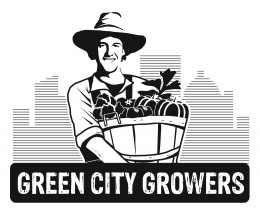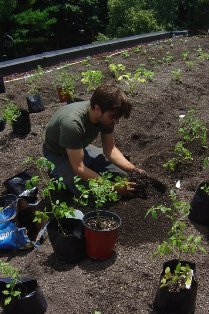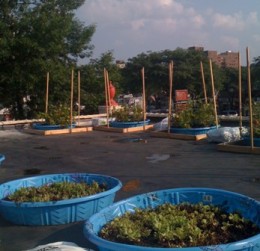Aug
23
11:38 am
by Kristen Schaer
In cities, where space is premium and green space is generally owned by city parks, having a patch of one’s own carries a significant importance. The benefits (aesthetic, economic and ecologic) are manifold. The sense of doing good doesn’t get much better than really digging in to soil, planting and then reaping the rewards of an intimate relationship with the land. Bad puns withstanding, this is why Somerville’s Green City Growers is a business in bloom.
In 2008, GCG co-founder Gabe Erde-Cohen returned from the West Coast armed with an idea from the Your Backyard Farmer program in Portland, Oregon. Erde-Cohen contacted college friend Jessie Banzahl about importing the idea to the East Coast and Green City Growers was born.
Banzahl, over the thrum of coffee grinders at Bloc 11 in Union Square, describes the inception of the business, working out of apartments and various Somerville coffee shops: “We met Wenzday Jane (owner of Metro Pedal Power, a human-powered bike delivery service) at a Somerville Local First event, and she mentioned that there was office space available in Olive Square in the Union Square area. Once we got a contract with Harvard Pilgrim Health Care, our program really took off in 2009.”
The alliance with Harvard Pilgrim proved to be mutually beneficial and more than one rooftop is greener for it. With the help of GCG, Harvard Pilgrim employees plant, grow and harvest gardens at their various Boston and Cambridge locations. The food is then donated to Quincy Community Action and Massachusetts Hospital School, among other locations throughout the city.
Green City Growers is involved in both residential and commercial planting. Their plant starts come from Allandale Farms in Brookline, a grower of Certified Natural Grown foods and Boston’s last working farm. Under the guidance of Ben Bois, the Horticultural Supervisor, and Anne Lemay Hurley, the Director of Operations, GCG has expanded their operations and scope steadily since 2009.
Dorchester’s The Ledge restaurant, in a partnership with GCG and Recover Green Roofs, has reaped the rewards of sustainable, local farming most recently with the completion of a rooftop vegetable garden in July. Executive chef Marco Suarez approached The Ledge with the idea of growing vegetables, herbs and greens on the roof of The Ledge with the purpose of using them in the restaurant. Suarez, described the scope and scale of the project: the garden comprises 28 tons of dirt in addition to a recycled tire bed that encloses the heirloom tomatoes, herbs, zucchinis, squash, greens, jalapenos and other locally-acquired, organically grown foods. (See video below from SLF Member Paper Fortress)
Suarez estimates that the cost of produce purchases will be defrayed as much as 40%, and the the insulation provided by the rooftop garden will cut down on heating and air-conditioning costs. Typically, most rooftops withstand about 10-15 years of the sun’s UV rays, but the rooftop garden allays that for up to 50 years, and even produces the effect of managing storm water.
Recover Green Roofs from Paper Fortress on Vimeo.
The eagerness with which local businesses, community members and non-profits have embraced the work of Green City Growers is gathering steam. Banzahl said GCG currently has twelve proposals submitted to local hospitals, high-end hotels, and corporations. Inman Square restaurant Ole is currently signed up for the spring growing season and there are high hopes that the Children’s Museum in the Seaport District will make a space for a garden that GCG can provide demonstrations and educational opportunities in. With the summer coming to a close and the fall planting season quickly arriving, Banzahl also mentioned the marketing of cold frames on the Green City Growers website. The cold frames provide a mini-greenhouse environment for the harsher winter months in the Northeast.
On the way out of Bloc 11, after enthusiastically relating the upcoming projects, Banzahl spoke about the many fulfilling aspects of her job, such as providing consultation for commercial and residential owners and the little quirks and unexpected wonders that come from working closely with people and the places they work and live. “We use ladybugs to cut down on aphid growth in the gardens we plant. We put them in the fridge, and they sleep until we pull them out and put them to work. It is funny to come to work in the morning, put your lunch in the fridge and see hundreds of little ladybugs.” Lucky lady.




